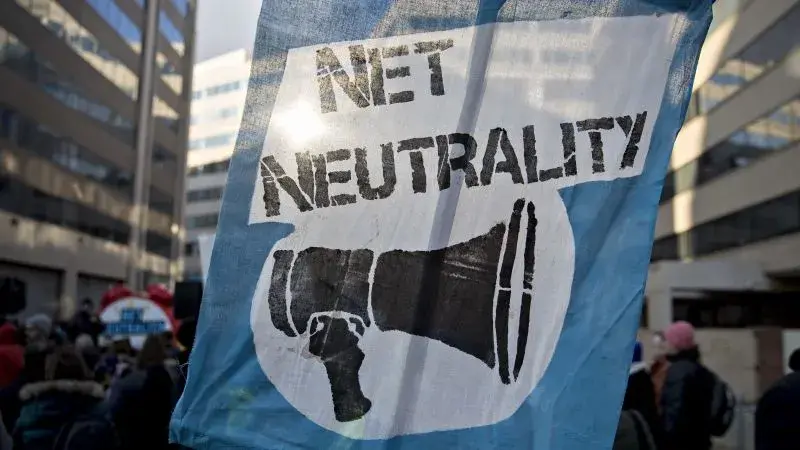And the moment a Republican administration is back, it’ll be gone again. This needs to be codified in law, not flip flopping every few years.
That would require Congress to act and Congress is barely capable of accomplishing the bare minimum to keep the budget running so the entire world isn’t thrown into chaos. Asking them to do anything that actually protects consumer rights is going to take either an emergency or an extreme electoral shift.
I don’t disagree. And while I agree with the FCC continually trying to keep Net Neutrality alive, it’s a stopgap measure at best, one that will come and go until there is an elected Congress that isn’t full of greedy, sycophantic, whiny, spineless pieces of shit.
Why would it necessarily have to be federal law, and not state law?
Well here’s a few off the top of my head…
- Interstate commerce is governed by the federal government. The internet is a bastion of interstate commerce.
- Schools now require the internet for kids. ISPs being allowed to be anything more than a dumb pipe means they have the control of what information is sent across their network.
- The internet is now a basic human right in the United States for numerous reasons, one of which is #2. Basic human rights have notoriously been mishandled by the states. See: slavery, indentured servitude, civil rights, voting rights, air and water treatment, etc.
- ISPs cross state boundaries and should be governed by interstate law.
An ISP being a business, especially a publicly-traded one, will sacrifice all manner of consumer/user-protection in order to maximize profit. And having the states govern against that will lead to a smattering of laws where it becomes muddy on what can actually be enforced, and where.
Net Neutrality, as a general concept, must be codified into federal law in order to help protect the common good and interest of such a basic utility – and yes, the internet is a utility despite in some places, very few in fact, where competition is available.
Interstate commerce is governed by the federal government.
Not exclusively. Interstate commerce implies that the feds can regulate it, not that they have exclusive power to do so. We see this with MJ laws. The fed believes it has the power to prohibit marijuana on the basis of interstate commerce, but in fact mj can be grown locally, sold locally, and consumed locally. Just like internet service can be.
Suppose you want to buy a stun gun in New York. You can find stun guns sold via mail order from another state (thus interstate commerce), but New York still managed to ban them despite the role of interstate commerce.
A close analog would be phone laws. The fed has the TCPA to protect you from telemarketers, but at the same time various states add additional legal protections for consumers w.r.t. telemarketing and those laws have force even if the caller is outside the country. (Collecting on the judgement is another matter).
Schools now require the internet for kids. ISPs being allowed to be anything more than a dumb pipe means they have the control of what information is sent across their network.
Education is specifically a duty of the state set out in the Constitution. If you can point to the statute requiring schools to provide internet for students, I believe it will be state law not federal law that you find.
The internet is now a basic human right in the United States for numerous reasons, one of which is #2.
I don’t quite follow. Are you saying that because education is a human right, that internet access is a human right? It doesn’t work that way. First of all, people who do not exercise their right to an education would not derive any rights implied by education. As for the students, if a state requires internet in education that does not mean that internet access becomes a human right. E.g. an Amish family might lawfully opt to homeschool their child, without internet. That would satisfy the right to education enshrined in the Unified Declaration of Human Rights (UDHR) just fine. A student attending public school in a state that mandates internet in schools would merely have the incidental privilege of internet access, not an expanded human right that students in other states and countries do not have under the same human rights convocation. If your claim were true, it would mean that California (for example) requiring internet provisions for students would then mean students in Haiti (a country that also signed the UDHR that entitles people to a right to education) or Texas would gain a right to internet access via the state of California’s internal law. A state cannot amend the UDHR willy nilly like that.
Also, if internet could be construed as a human right by some mechanism that’s escaping me, the fed is not exclusively bound by human rights law. The fed signed the treaty, but all governments therein (state and local) are also bound to uphold human rights. Even private companies are bound to human rights law in the wording of the text, though expectation of enforcement gets shaky.
ISPs cross state boundaries and should be governed by interstate law.
I subscribed to internet service from a WISP at one point. A dude in my neighborhood rolled out his own ISP service. His market did not even exceed the city.
The local ISPs have ISPs themselves and as you climb the supply chain eventually you get into the internet backbone which would be interstate, but that’s not where the netneutrality problem manifests. The netneutrality problem is at the bottom of the supply chain in the last mile of cable where the end user meets their local ISP.
Also with MJ laws, several states have liberated the use of marijuana despite the feds using the interstate commerce act to ban it.
An ISP being a business, especially a publicly-traded one, will sacrifice all manner of consumer/user-protection in order to maximize profit. And having the states govern against that will lead to a smattering of laws where it becomes muddy on what can actually be enforced, and where.
Sure, and if the fed is relaxed because the telecoms feed the warchests of the POTUS and Congress, you have a nationwide shit-show. A progressive state can fix that by imposing netneutrality requirements. Just like many states introduce extra anti-telemarketing laws that give consumers protection above and beyond the TCPA.
And having the states govern against that will lead to a smattering of laws where it becomes muddy on what can actually be enforced, and where.
That’s a problem for the ISPs that benefits consumers. If ISPs operating in different states then have to adjust their framework for one state that mandates netneutrality, the cost of maintaining different frameworks in different states becomes a diminishing return. US consumers often benefit from EU law in this way. The EU forced PC makers to make disassembly fast and trivial, so harmful components could quickly and cheaply be removed before trashing obsolete hardware. The US did not impose this. Dell was disturbed because they had to make pro-environment adjustments as a condition to access to the EU market. They calculated that it would be more costly to sell two different versions, so the PCs they made for both the EU market and the US market become more eco-friendly. Thanks to the EU muddying the waters.
The right to repair will have the same consequences.
Clearly you are smarter than I. Enjoy.
With Thursday’s party-line vote, the FCC redefined internet service as similar to legacy telephone lines, a sweeping move that comes with greater regulatory power over the broadband industry.
Leading FCC officials have said restoring net neutrality rules, and reclassifying ISPs under Title II of the agency’s congressional charter, would provide the FCC with clearer authority to adopt future rules governing everything from public safety to national security.
“Broadband is a telecommunications service and should be regulated as such,” said Justin Brookman, director for technology policy at Consumer Reports. “The Title II authority will ensure that broadband providers are properly overseen by the FCC like all telecommunications services should be.
“These 400-plus pages of relentless regulation are proof positive that old orthodoxies die hard,” said Jonathan Spalter, CEO of USTelecom, a trade association representing internet providers.
My god the fucking irony. The trade association made up of Broadband ISPs, arguing that they shouldn’t be regulated as Telecom providers, is literally called… USTelecom.
“Don’t treat us like ducks!” said the trade association representative from USDucks.
Thanks for pointing that out! That’s … truly special 😂
I think net neutrality is a good thing, but could this reclassification mean that the FCC will have increased authority to police content online? There has been a lot of worrying activity around that lately in general, and the FCC has a history of imposing censorship on traditional media.
Net Neutrality is about not policing content online. That’s kind of its whole thing:
These net neutrality policies ensured you can go where you want and do what you want online without your broadband provider making choices for you. They made clear your broadband provider should not have the right to block websites, slow services, or censor online content. These policies were court tested and approved. They were wildly popular. In fact, studies show that 80 percent of the public support the FCC’s net neutrality policies and opposed their repeal.
The closest we get to online censorship is obscenity laws, which one might think applies to porn, but obscenity is actually defined much more narrowly than just “content designed to arouse”. Obscenity is basically stuff that even Hugh Hefner would find offensive, stuff the average adult would find deeply repulsive and abhorrent (not just a little bit, the exact language is “patently offensive”). Adult content in general (obscenity & indecency) is banned from broadcast media during daytime hours to keep kids from seeing it; subscription-based services are exempt from such rules, which presumably means that the adults who pay for the subscription are supposed to be the ones preventing kids from using it to view adult material, if such is possible. I expect this is why anything which does manage to qualify as obscene is typically very hard to get to unless you really want to see it, so nobody who might report it ever actually finds it.
It’s worth mentioning that obscenity laws apply whether Net Neutrality is a thing or not, so having it will be a net reduction in the avenues through which content may be censored or policed. Now if only they’d ban ISPs from selling your data to brokers…
It’s worth mentioning that obscenity laws apply whether Net Neutrality is a thing or not
Couldn’t this reclassification affect that sort of thing in a jurisdiction sense though? Again, I like net neutrality, mostly because the idea of something like the standard internet option being Facebook only is terrifying, but it sounds like a big part of this is reclassifying ISPs to be subject to rules made by the FCC. I’d really rather it be a law passed by congress, and I worry about how federal agencies might abuse their powers over the internet when those powers are expanded in general. I’m not really sure how much it generally expands their authority over the internet, but it seems like it might.
“Title II” in this context refers to Subchapter II of 47 U.S.C. Chapter 5. 47 U.S.C. is the Communications Act of 1934, the act of Congress that established the FCC, and Chapter 5 is the part that deals with “Wire and Radio Communications.”
If you want to know what this law empowers the FCC to do, you can read the statute yourself. Or, if that’s too difficult, you can also use your access to the internet to look up more accessible sources, such as Wikipedia’s “Common carrier” article.
I feel like reading statutes is unreliable because a lot of how the law works is how courts interpret the law, which can be very different from the commonsense interpretation of the letter of the law. Lacking broader context, I can’t know from just this exactly what the consequences might be. Here’s some parts that are possibly concerning though:
The Commission may, in its discretion, prescribe the forms of any and all accounts, records, and memoranda to be kept by carriers subject to this chapter, including the accounts, records, and memoranda of the movement of traffic
Not sure if this increases the ability of the government to spy on people through their ISPs or if that remains the same.
(a) Requirement to restrict access (1) Prohibited conduct Whoever knowingly and with knowledge of the character of the material, in interstate or foreign commerce by means of the World Wide Web, makes any communication for commercial purposes that is available to any minor and that includes any material that is harmful to minors shall be fined not more than $50,000, imprisoned not more than 6 months, or both.
Some states have been experimenting with broad bans on online porn sites and requiring those sites and also social media sites to demand id from all users, maybe this provision could give a future FCC the power to apply this sort of thing to the internet nationally? Although this section already explicitly mentions the internet which is confusing if this whole thing is only recently being made relevant to the internet.
There are provisions about the FCC being able to come up with rules for the prevention of robocalls, maybe this could be generalized to prohibit some forms of automated network traffic?
This alone is enough to answer why people need to vote for Biden next term!!!
Finally, I remember the Ajit Pai era all too well when the FCC was auditioning for lucrative future revolving door private gigs. Rather than looking out for consumers.
Ajit Pai didn’t have to audition for anything. His employment was already guaranteed. He just had to do his assigned task. You see the same with NASA’s Kathy Lueders and SpaceX. The US is totally blind when it comes to the concept of conflict of interests.
PS: When I typed ‘Ajit Pai’, my phone auto corrected it to ‘Ajit Paid’. I guess even my phone knows!
That is the worst misrepresentation of Net Neutrality I’ve ever seen. This “article” makes it sound like the government is protecting you. It makes me want to vomit. They get away with this because nobody reads the actual bills. They just take what the media writes and accepts it as truth.
Can you elaborate? 'cause I sure as hell ain’t gonna look it up
Arstechnica has a good article explaining.
Now, for the user above, I’m not entirely sure what they’re talking about since this isn’t a bill that has been passed, but net neutrality is to protect consumers - it’s to ensure large companies cannot stack the deck to make you use their preferred (owned) services.
The user above is just one of those guys who looks at anything the dems do and thinks, look at this bitch eating crackers.
Nothing good can ever be celebrated or praised. It has to always be bad.
Thank you and sorry at the same time for not phrasing my question properly; I know what it is, I am just very baffled on how it should be a bad thing if they strengthen the enforcement net neutrality. Imo, this is always a pure win for the consumer as it prevents a lot of malicious business models. So basically: no idea what the initial commenter is complaining about.
no idea what the initial commenter is complaining about.
Indeed, and now thanks to the other comment I can reference that they’re just mad that bitch is eating crackers.
I get the feeling you cheerlead for big business and corporations over working people and unions.
Troll alert.
This comment is the worst misrepresentation of penguins I’ve ever seen. It sounds like a red herring. It makes me want to vomit. People get away with this because nobody actually knows what penguins are. They just take what the media writes and accepts it as truth.
On a serious note, plenty of people here surely know what net neutrality is. Net neutrality is the guarantee that your ISP doesn’t (de-)prioritize traffic or outright block traffic, all packets are treated equally. In other words it means you don’t have to pay $5 extra for high speed access to Lemmy because Reddit and your ISP (say Comcast) would prefer Lemmy not exist.
On a serious note, plenty of people here surely know what net neutrality is. Net neutrality is the guarantee that your ISP doesn’t (de-)prioritize traffic or outright block traffic, all packets are treated equally.
That’s true but it’s also the common (but overly shallow) take. It’s applicable here and good enough for the thread, but it’s worth noting that netneutrality is conceptually deeper than throttling and pricing games and beyond ISP shenanigans. The meaning was coined by Tim Wu, who spoke about access equality.
People fixate on performance which I find annoying in face of Cloudflare, who is not an ISP but who has done by far the most substantial damage to netneutrality worldwide by controlling who gets access to ~50%+ of world’s websites. The general public will never come to grasp Cloudflare’s oppression or the scale of it, much less relate it to netneutrality, for various reasons:
- Cloudflare is invisible to those allowed inside the walled garden, so its existence is mostly unknown
- The masses can only understand simple concepts about their speed being throttled. Understanding the nuts and bolts of discrimination based on IP address reputation is lost on most.
- The US gov is obviously pleased that half the world’s padlocked web traffic is trivially within their unwarranted surveillance view via just one corporation in California. They don’t want people to realize the harm CF does to netneutrality and pressure lawmakers to draft netneutrality policy in a way that’s not narrowly ISP-focused.
Which means netneutrality policy is doomed to ignore Cloudflare and focus on ISPs.
Most people at least have some control over which ISP they select. Competition is paltry, but we all have zero control over whether a website they want to use is in Cloudflare’s exclusive walled garden.
A website isn’t a common carrier, you cannot argue that a website isn’t allowed to control who they serve their content to. An ISP is a common carrier because they simply act as a dumb pipe between the provider (websites) and the consumer.
Cloudflare is a tool websites use to exercise that right, necessitated by the ever rising prevalence of bots and DDoS attacks. Your proposed definition of net neutrality would destroy anyone’s ability to deal with these threats.
Can you at least provide examples of legitimate users who are hindered by the use of Cloudflare?
A website isn’t a common carrier
We were talking about network neutrality, not just common carriers (which are only part of the netneutrality problem).
you cannot argue that a website isn’t allowed to control who they serve their content to.
Permission wasn’t the argument. When a website violates netneutrality principles, it’s not a problem of acting outside of authority. They are of course permitted to push access inequality assuming we are talking about the private sector where the contract permits it.
Cloudflare is a tool websites use to exercise that right,
One man’s freedom is another man’s oppression.
necessitated by the ever rising prevalence of bots and DDoS attacks.
It is /not/ necessary to use a tool as crude and reckless as Cloudflare to defend from attacks with disregard to collateral damage. There are many tools in the toolbox for that and CF is a poor choice favored by lazy admins.
Your proposed definition of net neutrality would destroy anyone’s ability to deal with these threats.
Only if you neglect to see admins who have found better ways to counter threats that do not make the security problem someone elses.
Can you at least provide examples of legitimate users who are hindered by the use of Cloudflare?
That was enumerated in a list in the linked article you replied to.
I’ve always wondered, what do Comcast’s boots taste like?
It’s worth noting that the FCC’s so-called “Open” Internet Advisory Committee (#OIAC) tragically gives two seats on the board to:
- Cloudflare
- Comcast
Both of whom are abusers of #netneutrality, especially Cloudflare. A well-informed Trump-free administration should be showing Cloudflare and Comcast the door ASAP.
Sure, Trump would just bring them back. But it’d at least be a good symbolic move.
Indeed, as someone else pointed out, the needed change should come from pro-netneutrality legislation. And the legislation needs to be broad enough to block Cloudflare’s broad discriminatory arbitrary attack on access equality, not just tinker with speeds at the ISP consumer level.
Whether the legislation is appropriate at the state or fed domain is unclear. Certainly if the orange tyrant takes power again, I would probably want state govs to be able to protect consumers from netneutrality abuses.
Removed by mod
relevant username
Removed by mod
🤖 I’m a bot that provides automatic summaries for articles:
Click here to see the summary
The US government on Thursday banned internet service providers (ISPs) from meddling in the speeds their customers receive when browsing the web and downloading files, restoring tough rules rescinded during the Trump administration and setting the stage for a major legal battle with the broadband industry.
The net neutrality regulations adopted Thursday by the Federal Communications Commission prohibit providers such as AT&T, Comcast and Verizon from selectively speeding up, slowing down or blocking users’ internet traffic.
The latest rules show how, with a 3-2 Democratic majority, the FCC is moving to reassert its authority over an industry that powers the modern digital economy, touching everything from education to health care and enabling advanced technologies such as artificial intelligence.
The vote marks the latest twist in a years-long battle between regulators on the one hand, who say consumer protections are needed to ensure all websites are treated equally, and ISPs on the other who describe the rules as heavy-handed government intervention.
Whether it is throttling content, junk or hidden fees, arbitrary pricing, deceptive advertising or unreliable service, broadband providers have proven over the years that without proper oversight, they will not hesitate to use their power to increase profits at the expense of consumers.”
In past legal battles over net neutrality, courts have deferred to the FCC, ruling that it has wide latitude to regulate ISPs as it sees fit using the authority it derives from the agency’s congressional charter, the Communications Act of 1934.
Saved 72% of original text.












